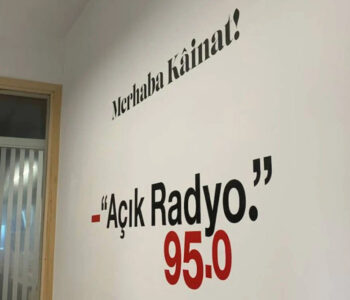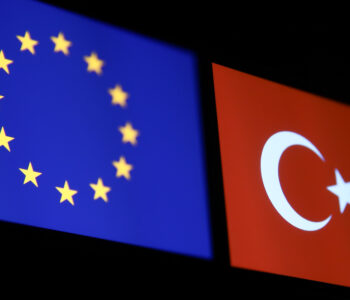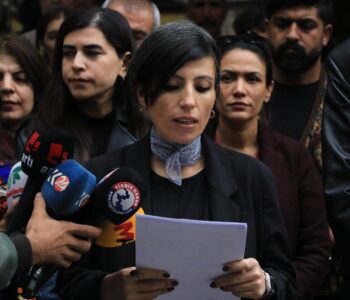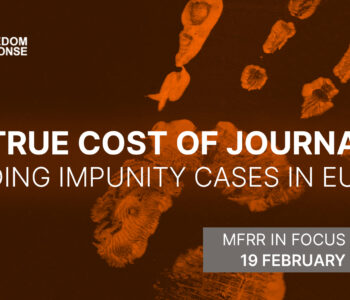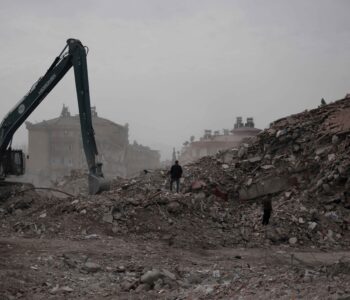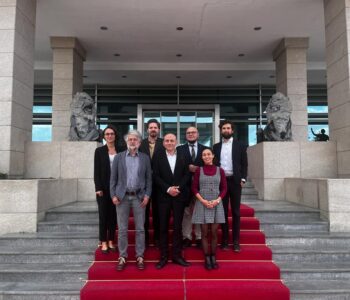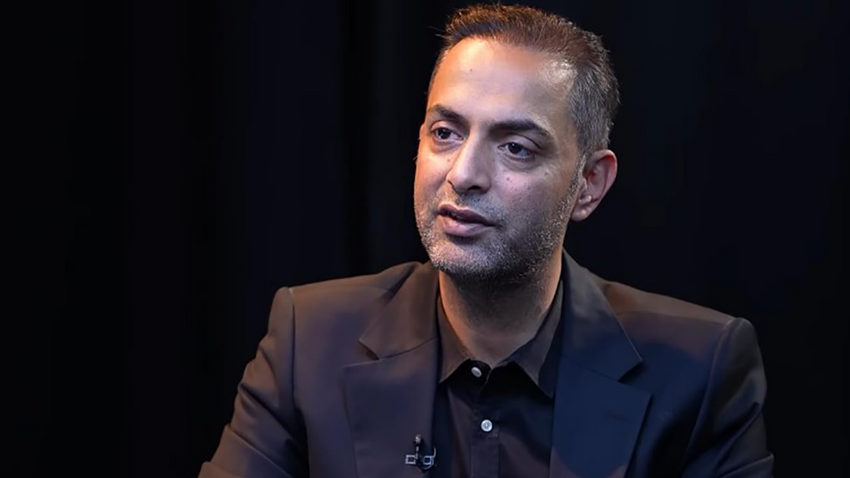 Library
Library
Freedom of the press and expression groups alarmed by…
Freedom of the press and expression groups alarmed by escalating death threats against journalist Murat Ağırel
The International Press Institute (IPI) and undersigned press freedom and freedom of expression groups strongly condemn the ongoing and intensifying threats against prominent Turkish journalist Murat Ağırel.
Turkish translation available below.
We are deeply alarmed by the persistent pattern of intimidation, surveillance, and death threats targeting Ağırel, which represent a severe assault on press freedom and the safety of journalists in Turkey.
These threats and acts of intimidation are not isolated incidents but part of a broader, systemic issue affecting press freedom in Turkey, where independent journalists frequently face significant risks in their pursuit of truth. We urgently call on the authorities to thoroughly investigate these threats and ensure that those responsible are held accountable.
Escalating assault on press freedom: Murat Ağırel’s harrowing year-long ordeal
The pattern of threats and intimidation against Ağırel has escalated significantly over the past year, with increasing intensity and frequency:
- November 21, 2023: Ağırel shared on X, formerly Twitter, that he received death threats related to his investigative work on money laundering and tax evasion allegations against Dilan Polat and Engin Polat, who were recently arrested for alleged money laundering.
- November 24, 2023: On the YouTube channel “Tactical Mania Plus”, hosts Nevzat Dindar and Alper Mert criticized Ağırel for mentioning the name of a Galatasaray (one of Turkey’s leading football clubs) executive in his reports on match-fixing allegations, insinuating a death threat against him.
- November 29, 2023: Ağırel revealed on a live broadcast on Halk TV that the threats extended to his family, including death and rape threats against his wife, 12-year-old daughter, and sisters, due to his reports on match-fixing allegations.
- May 10, 2024: Ağırel faced renewed threats due to his book “Havala,” which exposes drug trafficking and money laundering in Turkey. He reported instances of intimidation, including surveillance of his home and personal movements.
- June 12, 2024: Ağırel shared on X that he was under ongoing surveillance, with people filming his house, rummaging through his trash, damaging his car, and following his family members. Ağırel told the Committee to Protect Journalists (CPJ) that police identified and questioned some individuals but took no further action after they denied spying on the journalist.
- June 21, 2024: In an article in the pro-government newspaper Türkgün, Ağırel and three other journalists were openly targeted for their coverage of the Sinan Ateş murder case. The journalists were openly singled out because of their reporting.
- July 22, 2024: During a recent hearing in the Sinan Ateş murder case, legal experts from the Turkish government ally, far-right Nationalist Movement Party (MHP) filed a petition claiming the MHP was a “victim” and sought to participate in the case as an “aggrieved party.” The court denied the request. The petition accused various groups, including investigative journalists, with Ağırel and 62 other journalists being openly labeled as “agents of influence” by MHP spokespersons due to their journalism.
- Most alarmingly, on September 3, 2024, Ağırel received a new death threat via a video, where a masked individual claimed that a contract had been placed on his life and that an execution order had been issued. The individual also mentioned a parliamentarian allegedly involved in the threat.
- September 4, 2024: The General Directorate of Police issued a statement on their X account announcing the detention of two individuals responsible for threatening Ağırel in the video and recording the footage.
We are profoundly alarmed by the relentless death threats and the escalating harassment aimed not only at Murat Ağırel but also at his family. These brazen acts of intimidation are a stark reminder of the perilous environment in which independent journalists in Turkey must operate. We urge Turkish authorities to take immediate action to protect Ağırel and his family, thoroughly investigate these threats, and bring those responsible to justice, while upholding the principles of press freedom.
Basın ve ifade özgürlüğü kuruluşları gazeteci Murat Ağırel’e yönelik ölüm tehditlerini kınıyor
Uluslararası Basın Enstitüsü (IPI), aşağıda imzası bulunan basın ve ifade özgürlüğü kuruluşlarıyla birlikte gazeteci Murat Ağırel’e yönelik devam eden tehditleri kınıyor. Ağırel’i hedef alan ısrarlı gözdağı, takip ve ölüm tehditleri, Türkiye’de basın özgürlüğü ve gazetecilerin güvenliğine yönelik ciddi bir saldırıyı temsil ediyor.
Bu tehditler ve yıldırma eylemleri, bağımsız gazetecilerin Türkiye’de gerçeğin peşinde koşarken almak zorunda kaldıkları büyük risklerin son örneklerinden birini oluşturuyor. Yetkililere bu tehditleri kapsamlı bir şekilde soruşturmaları ve sorumluların hesap vermesini sağlamaları için acil çağrıda bulunuyoruz.
Basın özgürlüğü tehlikede: Murat Ağırel’e yönelik uzun süredir devam eden tehditler
Ağırel’e ve ailesine yönelik tehditler ve yıldırma politikası son bir yılda önemli ölçüde artış gösterdi:
- 21 Kasım 2023: Ağırel, X’te (eski adıyla Twitter), kara para aklama ve vergi kaçakçılığı suçlarından tutuklanan Dilan Polat ve Engin Polat hakkındaki araştırmaları ve haberleri sebebiyle ölüm tehditleri aldığını açıkladı.
- 24 Kasım 2023: “Tactical Mania Plus” adlı YouTube kanalının sunucuları Nevzat Dindar ve Alper Mert, Ağırel’i şike iddialarıyla ilgili haberlerinde Galatasaray’ı karalamakla suçladı ve gazeteciyi canlı yayında tehdit etti.
- 29 Kasım 2023: Ağırel, Halk TV’de katıldığı canlı yayında, şike iddialarıyla ilgili haberleri nedeniyle tehditlerin ailesine kadar uzandığını; eşine, 12 yaşındaki kızına ve kız kardeşlerine yönelik ölüm ve tecavüz tehditleri aldığını açıkladı.
- 10 Mayıs 2024: Ağırel, Türkiye’deki uyuşturucu kaçakçılığı ve kara para aklama süreçlerini ortaya çıkaran “Havala” adlı kitabı nedeniyle yeniden tehdit edildi. Evinin gözetlendiğini ve kendisinin takip edildiğini belirtti.
- 12 Haziran 2024: Ağırel, X’te (eski adıyla Twitter) sürekli gözetlendiğini, evinin videosunun çekildiğini, birilerinin çöplerini karıştırdığını, arabasına zarar verdiğini ve ailesini takip ettiğini paylaştı. Ağırel, Gazetecileri Koruma Komitesi’ne (CPJ) polisin bazı kişileri tespit edip sorguladığını ancak bu kişilerin Ağırel’i izlediklerini inkar etmesi üzerine haklarında herhangi bir işlem yapılmadığını belirtti.
- 21 Haziran 2024: Hükümete yakınlığıyla bilinen Türkgün gazetesindeki bir yazıda, Ağırel ve üç diğer gazeteci, Sinan Ateş cinayeti davasıyla ilgili haberleri nedeniyle açıkça hedef gösterildi.
- 22 Temmuz 2024: Sinan Ateş cinayeti davasının son duruşmasında Milliyetçi Hareket Partisi’nin (MHP) avukatları, mahkemeye MHP’nin “mağdur” olduğunu iddia eden ve davaya “mağdur taraf” olarak katılmayı talep eden bir dilekçe sundu. Mahkeme bu talebi reddetti. Dilekçede siyasetçiler, akademisyenler, hukukçular ve araştırmacılar hedef gösterildi. Ağırel ve 62 gazeteci, gazetecilik faaliyetleri nedeniyle MHP sözcüleri tarafından etki ajanlığı yapmakla suçlandı.
- 3 Eylül 2024: Maskeli bir kişi Ağırel’e, kendisinin öldürülmesi için ihale açıldığını ve infaz emrinin verildiğini söyleyen bir video gönderdi. Maskeli şahıs ayrıca ihaleyi bir milletvekilinin açtığını öne sürdü.
- 4 Eylül 2024: Emniyet Genel Müdürlüğü, X hesabında Ağırel’i videoda tehdit eden ve görüntüleri kaydeden iki kişinin gözaltına alındığını duyuran bir açıklama yayınladı.
Murat Ağırel ve ailesine yönelik ölüm tehditleri ve taciz eylemlerinden derin endişe duyuyoruz. Gazetecinin güvenliğini tehlikeye atan bu yıldırma eylemleri, Türkiye’de bağımsız gazetecilerin mesleklerini sürdürdükleri tehlikeli ortamın çarpıcı bir göstergesidir. Türkiye’deki yetkilileri, Ağırel ve ailesinin güvenliğini sağlamak için derhal harekete geçmeye, bu tehditleri kapsamlı bir şekilde soruşturmaya ve sorumluları adalet önüne çıkarmaya çağırıyoruz.
İmzalayanlar
- Uluslararası Basın Enstitüsü (IPI)
- ARTICLE 19 Avrupa
- Articolo 21
- Avrupa Basın ve Medya Özgürlüğü Merkezi (ECPMF)
- Avrupa Gazeteciler Birliği (AEJ)
- Avrupa Gazeteciler Federasyonu (EFJ)
- Çağdaş Gazeteciler Derneği (ÇGD)
- Danimarka PEN
- Gazeteciler Cemiyeti, Ankara
- Gazetecilikte Kadın Koalisyonu (CFWIJ)
- Gazetecileri Koruma Komitesi (CPJ)
- Güney Doğu Avrupa Medya Örgütü (SEEMO)
- Index on Censorship (Sansür Endeksi)
- İsveç PEN
- Medya ve Hukuk Çalışmaları Derneği (MLSA)
- OBC Transeuropa (OBCT)
- PEN Amerika
- PEN Kanada
- PEN Norveç
- Punto24 Bağımsız Gazetecilik Derneği (P24)
- Türkiye Gazeteciler Sendikası (TGS)
- Uluslararası Gazeteciler Federasyonu (IFJ)
- Uluslararası PEN
Bu açıklama, Avrupa Komisyonu tarafından finanse edilen ve AB Üye Devletleri ile aday ülkelerdeki basın ve medya özgürlüğü ihlâllerini belgeleyen Avrupa çapında bir mekanizma olan Medya Özgürlüğü Acil Müdahale (MFRR) kapsamında Uluslararası Basın Enstitüsü (IPI) tarafından hazırlanmıştır.
This statement was coordinated by the Media Freedom Rapid Response (MFRR), a Europe-wide mechanism which tracks, monitors and responds to violations of press and media freedom in EU Member States, Candidate Countries and Ukraine.

